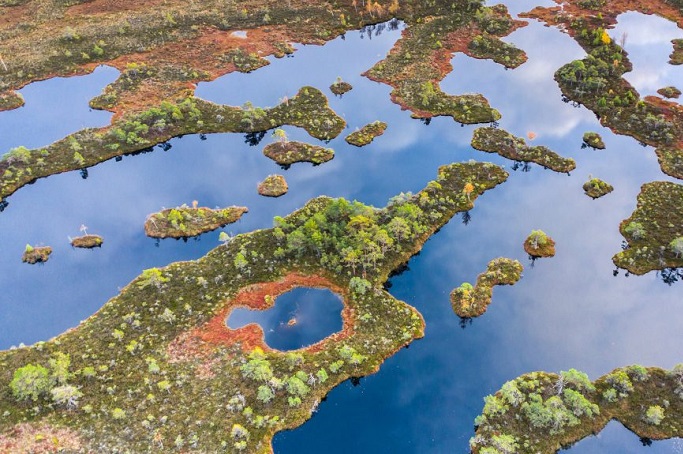11 Dec 2024

Tired Earth
By The Editorial Board

Peatlands are the most condensed terrestrial carbon store in the world and should be rewetted regardless of today’s use to reach our climate goals, write Jutta Paulus and Jörg-Andreas Krüger.
Jutta Paulus is a German lawmaker from the Greens/EFA group in the European Parliament and shadow rapporteur for the Nature Restoration regulation in the environment committee. Jörg-Andreas Krüger is president of NABU, the German Nature and Biodiversity Conservation Union.
Our natural heritage – grasslands, forests, peatlands and other ecosystems – is our greatest ally in tackling the climate crisis.
That’s why Europe’s draft nature restoration law, complementing the existing Birds and Habitats Directives, is a ground-breaking opportunity.
The much-needed ambitious legislation is the first of a kind: a continent-wide set of binding targets to restore degraded ecosystems.
We must seize this moment to bring back our nature by protecting and restoring the ecosystems that capture and store carbon, helping to protect us against the worst effects of climate change.
Peatlands are the most condensed terrestrial carbon store in the world. In these wetlands, growing vegetation (for example, cottongrass and bog moss in northern hemisphere bogs) dies and partially decomposes in waterlogged conditions to form peat, at the rate of about 1 cm of peat per decade.
Known by many names (including bog, moss, marsh, mire, fen and swamp) these biodiversity-rich ecosystems are an essential buffer against climate change: a 15 cm layer of peat contains more carbon per hectare than a tropical rainforest.
The extraordinary carbon storage capacity of peatlands is one of the reasons why drained peatlands are a major source of greenhouse gas (GHG) emissions.
In the EU, half of all peatlands have been drained and thus turned into carbon emitters. On a global scale, the EU is the second-largest emitter of GHG from degraded peatlands.
Approximately 7% of total GHG emissions in the EU come from drained peatlands used for agriculture or forestry.
Rewetting drained peatlands is necessary to stop emissions and is the first step towards restoration. To halt emissions from degraded peatlands, we urgently need to plug the ditches and raise the water levels.
We can do this without necessarily taking peatlands out of use, but we urgently need more support, especially under the common agricultural policy, for transitioning to wet agriculture and forestry, i.e. paludiculture.
Under the nature restoration law, the EU would mainly restore drained peatlands that are under agricultural use.
But we must rewet drained peatlands regardless of today’s use, except for land used for housing, in order to reach climate neutrality by 2050. By 2030, 30% of EU peatlands should be rewetted.
With nearly 95% of Germany’s peatlands degraded, and as the greatest emitter of carbon from peatlands in the EU, it is clear that Germany has a particular responsibility here. Rewetting and restoration are necessary to meet our national emissions reduction targets.
In Germany, drained peatlands constitute only 7% of the total agricultural land area. But these drained peatlands account for 37% of all emissions from agriculture (including animal husbandry).
Germany’s largest nature conservation non-governmental organisation NABU has a proud and longstanding history of peatlands conservation work.
Over one hundred years ago, in 1911, NABU’s predecessor purchased 16 hectares of peatland in the Federseemoor in Southern Germany to preserve it for future generations – people like us, and those that will come after us.
In 2014, NABU established the International Peatland Fund, and it’s this fund, together with project funding from the LIFE programme, that is financing NABU’s current flagship peatlands project, LIFE Multi Peat.
As part of the project, another 689 ha of peatlands will be restored enabling policy towards more peatland restoration to be brought forward.
In addition, the new NABU Climate Fund (NABU-Klimafonds) supports the rewetting of peatlands, currently mainly in Germany and EU countries in the Baltic Sea region.
In fact, much of what we know about the multiple benefits flowing from peatland restoration is due to the accumulated learning from projects co-financed by LIFE right from the start of the programme in the early 1990s.
Alongside rewetting and restoration techniques, many of today’s LIFE projects on peatlands focus on quantifying the climate adaptation and mitigation benefits and sharing these learnings widely, in policy and in practice.
On 26 April in Berlin, LIFE Multi Peat will live stream presentations from top peatlands experts sharing their insights on peatlands restoration in Europe.
Restoring nature is a necessary climate action. All the evidence from LIFE peatlands projects shows that carbon neutrality through rewetting and thus halting emissions can be achieved quickly, but creating long-term, large-scale carbon sinks and active sequestration takes much longer. There is no time to lose.
That’s why we strongly recommend the adoption of the nature restoration legislation by the end of 2023.
We must ensure that by 2030, at least 30% of our lands and seas are covered by effective area-based restoration measures, and that large-scale nature restoration is well underway.
We further support a strong accountability framework to ensure all Member States contribute fairly to the implementation of the law and can be held accountable. To support them, dedicated nature restoration funding must form a significant part of the next EU budget.
During this United Nations Decade of Ecosystem Restoration, let us ensure that our policy frameworks are robust and fit for the enormity of the task of bringing our nature back to life.
Source : euractiv.com
Comment